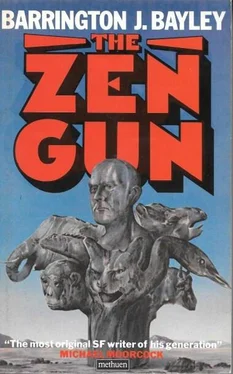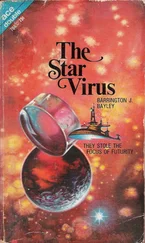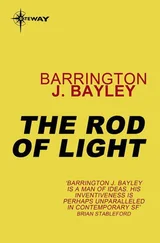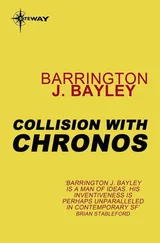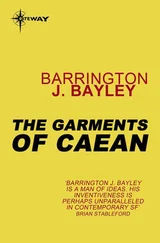At first it could, perhaps, have been another moving city, but soon it bulked too large for that and could only have been a peculiarly arc-shaped mountain of a yellow-puce colour. And then, as the time inexorably passed, it became too huge for any mountain.
The moon was rising. It was the moon.
Up it came, and up, more and more of it. It had closed the remaining distance to Earth in an amazingly short time. A hush fell over the moving city, a hush that lasted for hours while gradually the moon rose and became a vast plate that covered the world like a lid—though Hesper, an experienced space traveller, easily discerned its sphericity. No one spoke or moved, except to sip at the drinks that continued to be served by the dutiful waiters, both robot and human. Instead, everyone’s gaze and consciousness became transfixed by the new, solid sky that passed over.
The sun illuminated the-face of the satellite throughout from below the horizon, its light filtering round the atmosphere, though the moon’s disk eventually darkened towards the centre. The yellowishness of its early approach quickly vanished and it became first dazzlingly white then greyish and grained. Easily visible were the great craters gaping upside down, the ancient splashes of lighter dust that rayed out from many of them, and the vast flat plains. Visible too, were signs of the past works of man: furrows from mining operations, fine lines that were transport networks.
By midnight the entire disk had lifted itself clear of the landscape, a satellite ceiling hanging so low it was as if one could reach up and touch it, and leaving only a narrow rim of blackness to all points of the compass. Hesper realised it was so close it must be grazing Earth’s upper atmosphere. But how could this be? Long before now its approach should have heaved up such tides in sea, land and air as utterly to destroy everything upon the planet. Not only that, the satellite should be beginning to break up as a result of even greater tidal stresses induced in it by the larger body. It was a long way inside Roche’s limit.
And having come this close, its trajectory should be one ending in direct collision, and that bare minutes away. Instead, this the most stunning spectacle ever beheld upon planet Earth was gliding silently and leisurely by, creating no disturbance and blithely ignoring the laws of physics. Sometime after midnight its apparent diameter began slowly to diminish, so that by dawn, when it was sliding down the opposite horizon in answer to Earth’s turning, it was noticeably smaller. It was receding back into space, having given the planet a near miss.
It was, Hesper thought as the Mohists, indeed all the inhabitants of nightside Earth, stirred from their captivated vigil, just as if Earth and its moon had ceased to exert any gravitational influence on one another at all.
On board the ICS Standard Bearer the command staff also watched the behaviour of Earth’s moon in perplexity. Having mopped up those fugitives who had fled to the fourth planet, they had held back from pursuing the sole blip to be seen plunging into Earth’s atmosphere, believing they were about to witness one of the rarest sights: the destruction of an inhabited world through planetary collision. The business was made more eerie by the absence of the panicky exodus one might have expected; but this, Archier learned, was due to all available ships having left for Mars several days earlier.
Now the satellite was half a million miles from its onetime primary, and appeared to be following an “independent orbit about the sun. Yet at its closest it had practically ploughed through Earth’s atmosphere!
“Well,” Archier said to his chief engineer, the only crew member he could think of who might be an expert in such matters, “is it possible?”
“What, Admiral?”
“Is it possible for gravity to cease between two orbiting bodies?”
The chief engineer, a rangy gorilla, scratched his head in puzzlement. “No sir, it isn’t. When two bodies gravitate the whole weight of the universe is behind them, so to speak. I don’t understand it.”
“There’s got to be an explanation.”
“Well never mind about that now,” Gruwert squealed. “Our orders are to hunt down rebels. It’s safe to move in now so let’s get on with it.”
“First of all we shall have to reply to Earth Council.”
The ships of Ten-Fleet were again beginning to gather round their flagship, a fact that had not escaped notice on Earth. For once, the presence of an Imperial fleet caused more comfort than alarm. Since Earth and the moon now shared nearly the same orbit in ignorance of one another, it would only be a matter of time before they did collide. Plans were already afoot to disintegrate the errant satellite or direct it into the sun. The fleet had been requested to render assistance with a planet-buster bomb.
The request had caused Archier wry amusement. It was universally assumed all Imperial fleets had magazines full of planet-busters. In fact Ten-Fleet did not have any at all. Their production had always been strictly limited and since the onset of the robot strike replacement of their degradable cores had very nearly ceased. He had heard Seventeen-Fleet still had a few in working order.
He turned to Arctus. “Tell them it would be too dangerous to disintegrate the satellite at one blow. Too many pieces would be flying around. Tell them to work out a solution using conventional FE.”
A voice sounded in his ear. “ Claire de Lune has joined formation, Admiral.”
“ What? She was supposed to have been abandoned.”
“Evidently not.”
“What’s her report?”
“No word from her at all yet. I think her communications are out.”
“Well they’ll sort it out, I suppose.” He was about to give the mental “turning away” signal when his caller, the Fleet Manoeuvres Officer, continued: “Actually that isn’t what I really called to tell you. The Fast Barge is approaching. We’ve received its blazon burst.”
Archier didn’t reply at once. A shiver of nervousness went through him.
“How soon?”
“Within the hour.”
“All right, FMO. Thank you.”
He sat brooding. Then he turned to those around him. “Did you all catch that?”
They nodded.
“It looks,” he said, “as if we might finally find out what’s been going on in Diadem…”
The Fast Barge was the property of the now defunct High Command. Consisting of little more than living quarters and a gigantic feetol drive unit, it was capable of reaching almost any part of the Empire in a remarkably short time. Ostensibly its purpose was to assist in state occasions in the outer parts of the Empire. In reality it was kept in reserve for use in an emergency, to carry messages too important or too risky to send by leader tone transmission, or as a getaway vehicle…
As the barge slowed down and passed the outskirts of the planetary system, its leader tone blazon announced the presence of dignitaries aboard. Minutes later Archier, in full dress uniform, waited in the reception bay with his other command officers as the barge drew alongside.
It was an impressive sight as seen on the wall screen. Nearly as big as the flagship itself, it was gridded and grilled with designs of gold and rose-pink. The shape was unusual: resembling more than anything else some over-lavishly petalled flower or orchid and owing nothing to utility.
There was a resonant splang as the connecting passage between the two ships sprang into place. Padding through the broad opening came a party headed by two tall and broad-shouldered men of mature years whom Archier instantly recognised: they were the Admiral Overlords Crane and Oblescu, members of the High Command Staff. But instead of dress uniform they were wearing office-attire that looked stained and crumpled. Their faces were weary, even overwrought.
Читать дальше
